[PYTHON] (Mainly published in September 2008) Recommended books for IT / AI engineers
In this article, I will introduce and explain the good books that I read in August 2020 and posted my impressions on Twitter.
Introduction
This article is a summary of the book impressions I read this month from my twitter post. (These readings are a private hobby, not a work)
In addition to the book introduction, I tweet a lot of IT / AI / Biz related information, so If you want to collect information on these fields, please follow us ♪ (There is a lot of overseas information)
** Twitter **: Yutaro Ogawa @ISID_AI_team
Books read in September 20
The calligraphy is posted only when it is published on Publisher.com.
(Past article) ● Click here for the article for July 2008 ● Click here for the article for August 2008
- Most of the books I read are business-related (I often look up IT-related books online or read them all at once).
It conforms to the three areas of the Data Scientist Association, but business is important even for IT / AI engineers. Below in my head

AI related
[Recommended / No. 1]
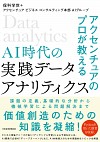 ** "Practical data analytics in the AI era taught by Accenture professionals" **
https://www.amazon.co.jp/dp/4532135060
** "Practical data analytics in the AI era taught by Accenture professionals" **
https://www.amazon.co.jp/dp/4532135060
You can learn the entire flow of data science projects and elemental technologies & knowledge by linking them with petit business cases.
The content and words are a little difficult.
・ Newcomers who have taken machine learning and statistical analysis at university ・ Those who have learned machine learning algorithms in the introductory book
However, as the next book to read, I felt that it was a good book to learn the way of thinking and thinking in the field when using AI for business.
[Recommended / 2nd place] ** "Engineers in VOYAGE-Engineers in Engineering" ** https://www.amazon.co.jp/dp/4908686092
There are many stories related to VOYAGE's unique business,
"Chapter 6 Machine Learning for Business by Data Science Engineers" is highly recommended.
How did you think about AI utilization and business value in ad tech (advertising system) and how did you implement it? The on-site efforts are explained very carefully.
[Recommended / 3rd place]
 ** "Object detection by PyTorch" **
https://www.amazon.co.jp/dp/4274225933
** "Object detection by PyTorch" **
https://www.amazon.co.jp/dp/4274225933
Object detection, SSD, PyTorch are explained carefully in one book.
・ Annotation software for object detection ・ Application of SSD to video ・ How to use YOLOv3, M2Det, Detecron2 There are also applied topics such as
I would like to thank you for referring to my book "Development Deep Learning".
IT related
[Recommended / No. 1]
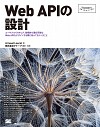 ** "Web API Design" **
https://www.amazon.co.jp/dp/B08CK2H12H
** "Web API Design" **
https://www.amazon.co.jp/dp/B08CK2H12H
This is an API design manual that emphasizes the UX perspective.
Especially Chapter 12, "How to Write API Documents" Chapter 13, "API Checklist" Is useful.
However, there are many parts where it is okay to scan it to some extent. I felt that (many people who read this book know it).
Biz related
[Recommended / No. 1]

** "Science in the workplace Microsoft Japan Work Style Reform Promotion Team x" Work styles that produce results "understood by business improvers ** https://www.amazon.co.jp/dp/4163912371/
This is a collection of examples of work styles that produce results based on the analytics data of MS O365.
It's a good example of data-driven management reform. It is also useful for establishing remote working styles and agile development methods.
Here are some of my personal favorites (slightly replaced with my words)
[1] Personal career and organizational development are two wheels
――What kind of growth can you achieve in this organization? ――What skills can you acquire and how you can grow under this boss?
You can do your best in the work in front of you because you can see these career plans and share them with your boss. (If you don't share your career plan with your boss, you will think about your career and change jobs nowadays.)
[2] Specific examples from the data in this book are suggestions, and data analysis is used as a ** stance to confirm progress toward "the direction we are aiming for" **. (I think it's okay to describe the cases in this book so as to prevent mistakes in causality and correlation.)
[3] The load increases when there are 6 or more subordinates (It is true that to turn 1on1 once every two weeks, the limit is 6 people out of 3 people a week)
[4] There is a correlation between the growth of employees and the expansion of their internal connections.
[5] The importance of taking a two-hour chunk of intensive work (In my case, I secure it from 7:00 to 9:00 in the morning)
[6] There is a correlation that the satisfaction of subordinates is high when the network of bosses is wide.
[7] Importance of 1on1 implementation once every two weeks (I am also 1on1 with team members at this pace)
[8] The point of reform is to decide what to stop
Organizationally, when launching a new project, think about quitting instead, and if you do not make spare capacity, the burden will increase
The following content is not in this book,
"Stop something" is the ** management strategy ** itself.
** Strategy is the abbreviation of fighting, and the management strategy is to decide what to abbreviate = quit. ** **
If the management cannot do this, the employees below will be exhausted, unable to do what they want to do, and will leave their jobs. It is important to give superiority or inferiority to the content that the organization works on.
By the way, management is ** "doing what is essentially important" **
The word "meridian", as used in "meridian", means a vertical line, a line that runs vertically, and means the essence.
In other words, ** management is to do the essential things that make sense **.
Therefore, "work style reform" and "work style that produces results" are linked to management strategy. A management strategy is to "work on essential matters with superiority or inferiority."
It was a good book that gave examples and ideas based on the data to speculate on these ♪
[Recommended / 2nd place]
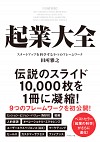 ** "Nine Frameworks for Science of Entrepreneurship Startups" **
https://www.amazon.co.jp/dp/4478109508
** "Nine Frameworks for Science of Entrepreneurship Startups" **
https://www.amazon.co.jp/dp/4478109508
This is a new book by Mr. Tadokoro, who is famous for his book "Science of Business".
When I first saw the title, was it just a rehash of "Science of Business"? I thought, It was completely different. (Personally, I wish I had made the title better)
"Science of entrepreneurship" is an explanation of the part that makes 0 to 1.
And this ** "Entrepreneurship Complete" is an explanation of how to expand your business from 1 to 100 **.
Therefore, even if you are not in a startup or venture There are many useful contents for ordinary business people involved in new businesses, and there are plenty of useful contents.
The Entrepreneurship Encyclopedia explains the following nine frameworks chapter by chapter.
- MVV (Mission Vision Value)
- Strategy
- Human resources
- Operation excellence
- Customer experience UX
- Marketing
- Sales
- Customer success
- Finance
[Recommended / 3rd place]
** "Business concept brand communication" ** https://www.amazon.co.jp/dp/4883354989
It's not a book about branding itself, but a book about Panasonic's branding activities.
・ CI = MI + BI + VI ※ CI = Corporate Identity MI = Mind Identity / "Unification of Philosophy" BI = Behavioral Identity / "Unification of Behavior" VI = Visual Identity / "Unification of Vision"
Specific examples of branding strategies and activities based on
・ Thought leadership strategy
Thought leadership means that a company can become a leader in a particular field (industry, theme, social problem) by quickly discovering and presenting innovative ideas and solutions that anticipate the future.
https://www.innovation.co.jp/urumo/thought-leadership/
・ Komatsu's customer relationship 7-stage model

https://komatsu.disclosure.site/ja/themes/93
It was a book with a lot of learning.
In the book,
Isn't that bond = branding that keeps connecting with customers through the practice of the management philosophy?
Drucker's idea is that "the purpose of the business is customer creation." (The purpose of business is to create customer) I feel something that is familiar to the idea of.
We will put our management philosophy into practice with MI + BI + VI, and as a result, we will create customers and continue to connect.
In this way, when thinking about branding of companies and organizations, Recognize the importance of inner branding.
** The corporate philosophy does not become a decoration of the company It affects the way of thinking and behavior (MI, BI) of employees in the company, and the corporate philosophy and MI, BI are in agreement **
I felt its importance.
[Recommended, 4th place]
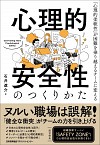
** "How to create psychological safety: Change to a team where" psychological flexibility "overcomes difficulties" ** https://www.amazon.co.jp/dp/B08JVDFT59
This is a commentary book on how to create an important "psychological safety" for a productive team.
・ Four factors that inhibit the formation of psychological safety ** (ignorance, incompetence, obstruction, negative) fear **
・ Four factors that form psychological safety ** (Easy to talk, help each other, challenge, welcome newcomers) **
Explains how to actually act around
What I especially liked was
Instead of thinking "there is a problem in the team" for the problem that is occurring in the team
** Incorporate yourself into the problem Thinking that "I am involved in the occurrence and formation of the problem", I look back on my actions **
I felt that the behavioral perspective was true.
In addition, as a benefit of the book, a paid "team psychological safety measurement service" is available. It was good to be able to try it for free.
[Recommended, 5th place]
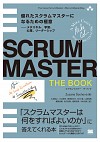 ** "SCRUM MASTER THE BOOK The secret to becoming an excellent Scrum master" **
https://www.amazon.co.jp/dp/4798166855
** "SCRUM MASTER THE BOOK The secret to becoming an excellent Scrum master" **
https://www.amazon.co.jp/dp/4798166855
A rare book focusing on Scrum Master (SM).
Coaching and leadership are described in the context of a Scrum Master.
I found it useful not only for Scrum Masters, but for everyone related to Scrum.
The part that resonated personally
・ The purpose of SM is "team self-organization" (The book also describes how to measure the degree of self-organization)
・ Practice of coaching that seriously believes that "these people will come up with a better solution than the solution in their head"
Certainly, I rarely give specific instructions on how to do it, except for newcomers.
However, "I think it would be interesting if this happens", "Please do this", Only the image of After is shown, and the method is left to each person. (If you are in trouble and stagnant, I will help you)
Since I've been in PO recently, I'm drafting a ticket (PBL: Product Backlog) that focuses on business value, and it feels like the tech team is left to the autonomy.
Output
There is no point in reading only books, so output is also important. Here's what I published this month:
【Qiita】 ● Impressions of conducting a casual interview with "Sokumen-kun" ● Tips for speeding up learning and inference with PyTorch ● How to interactively draw a machine learning pipeline with scikit-learn and save it as HTML ● How to automatically generate API document with Django REST framework & POST from document screen
【Medium】 [● Try deep reinforcement learning with "AllenAct"](https://medium.com/pytorch/allenact-%E3%81%A7%E6%B7%B1%E5%B1%A4%E5%BC%B7% E5% 8C% 96% E5% AD% A6% E7% BF% 92% E3% 82% 92% E8% A9% A6% E3% 81% 99-9b3d636cbd61? Source = friends_link & sk = ebd92c42e13eafd58b3052c9d61df7e2)
[External announcement: Slideshare] ● Recent Deep Learning Trends_20200925 "Content" About self-supervised learning, semi-supervised learning, transfer learning, meta-learning, imitation learning, reverse strengthening learning, active learning An overview, typical algorithm names, and recommended tutorial videos for learning each content are explained.
in conclusion
This is the introduction of the books recommended for IT / AI engineers that I read in September 2008.
【Writer】 Information Services International-Dentsu (ISID) AI Transformation Center Development Gr Yutaro Ogawa Main book "Learn while making! Deep learning by PyTorch", etc. ["Self-introduction details"](https://github.com / YutaroOgawa / about_me)
【Transmission of information】 In IT / AI and business / management, I publish articles and sites that I find interesting on Twitter. If you want to collect information on these fields, please follow us ♪ (There is a lot of overseas information) ** Twitter **: Yutaro Ogawa @ISID_AI_team
** [Other] ** The site of the AI Transformation Center to which I belong is here https://isid-ai.jp/
[Disclaimer] The content of this article itself is the opinion / transmission of the author, not the official opinion of the company to which the author belongs.